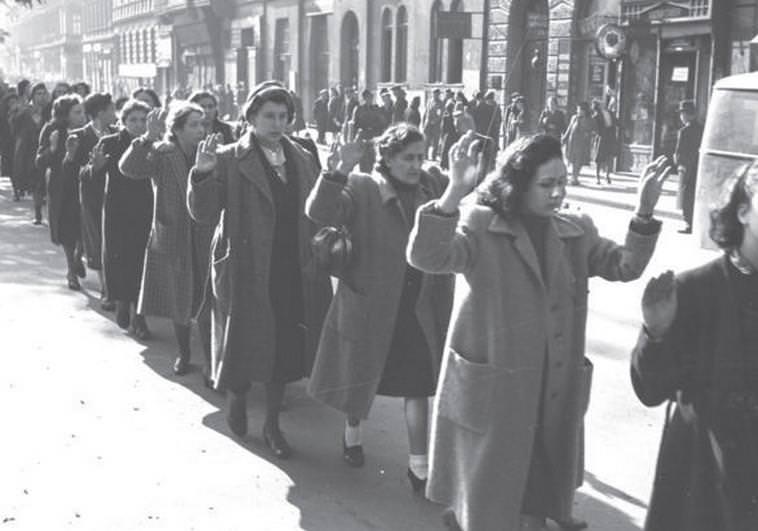More than 6,000 pages were found documenting the city’s former Jewish residents.
by Sam Sokol

Jewish women are rounded up by Nazis and Hungarian fascists, Wesselényi Street, Budapest, October 1944.. (photo creditWIKIPEDIA:: GERMAN FEDERAL ARCHIVE)
A couple renovating their apartment in Hungary’s capital happened upon thousands of pages of census records documenting Budapest’s Jewish population culled for the purposes of ghettoizing them during the Holocaust, media reports said.
According to a report in The Guardian, Gabor and Brigitte Berdefy found behind a wall in their home more than 6,000 pages of records used to track down Jewish inhabitants of the city so that they could be moved to a ghetto for subsequent deportation to Auschwitz.
“Jewish people filled in the forms honestly, they refused to believe where this might end up,” Istvan Kenyeres, who runs the city archives and is now in possession of the papers, was quoted as saying.
While most of the census still remains missing, “the content and scale of the finding is unprecedented,” Kenyeres said. “It helps to fill a huge gap in the history of the Holocaust in Budapest.”
Deportations for rural Jews began immediately following Germany’s invasion and occupation of its onetime ally in 1944. But many of the Jews of Budapest were saved by the arrival of the Russian Red Army only months after the ghetto’s establishment.
Last January, the Hungarian ambassador to the United Nations officially took responsibility for his country’s role in the Holocaust. That statement came only days after the local Jewish community accused Budapest of engaging in Holocaust revisionism.
At the time, the Federation of Hungarian Jewish Communities (Mazsihisz) had been involved in a high-profile dispute with President Viktor Orbán’s administration over incidents it claimed showed a tendency to downplay the role of Hungarians in genocide of their country’s Jewry.
That conflict led to a yearlong boycott of the government’s official 2014 Hungarian Holocaust Memorial Year.
Hungary holds the rotating chairmanship of the International Holocaust Remembrance Alliance (IHRA). It is strongly lobbying to revise the European Union’s General Data Protection Regulation, a measure touted by policymakers as creating a “right to be forgotten” for EU citizens, a data protection regime in which people may compel search engines and archives to delete or withhold information about them.
Both Hungary and IHRA say that Holocaust researchers in Europe have had their investigations hampered by restricted access to official archives, with the GDPR often cited as rationale for rejecting requests to view certain documents.








